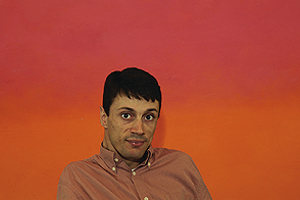2007 William Pollak Teaching Award for Teaching Excellence in Law: Adam Samaha
By Sabrina L. MillerNews Office
 Adam Samaha (Photo by Beth Rooney) | |
As a child, Adam Samaha, Assistant Professor in the Law School, attended a few criminal law classes his father taught and he remembers thinking, “How exciting and challenging. Maybe I should do that.”
He developed the same passion for teaching as his father, Joel, a professor at the University of Minnesota, and it has not gone unnoticed by students. Students in the Law School awarded Samaha the 2007 Graduating Students’ Award for Teaching Excellence.
“I think it’s terrific, although I don’t know whether this would have been possible had David Currie not retired,” Samaha joked, referring to the Edward H. Levi Distinguished Service Professor Emeritus in the Law School, who won the award four times.
Like his colleagues, Samaha is a prolific writer, and he values research and the classroom experience at the Law School.
“I try to teach to my own standard of excellence, and I’ve got things about half as good as I want them to be,” Samaha said.
Samaha specializes in constitutional law, the federal judiciary and democratic theory. He is a Harvard Law School graduate and was an editor of the Harvard Law Review. He teaches civil procedure to first-year law students, which he said puts him in the unique position of investigating fundamental legal concepts with a new generation of students every year.
“I try to build an atmosphere of intellectual freedom, where students are comfortable exploring multiple viewpoints and comfortable modifying their initial viewpoints as well,” Samaha said.
“Effort doesn’t always pay off in good consequences, so I’m indescribably grateful for the graduating students vote of confidence,” he said.
Good efforts also have paid off for Douglas Baird, the Harry A. Bigelow Distinguished Service Professor in the Law School, the winner of the Graduating Law Students’ Class Award for the third time. The award recognizes “a member of the faculty or staff who made a unique and substantial contribution to improving the quality of student life and who enriched the spirit of community within the Law School.”
Baird brushes aside his own recognition and points to Samaha’s teaching ability.
“It is terrific, of course, but it is even better that young faculty are being recognized for what they do,” said Baird, a former Dean of the Law School and a faculty member since 1980.
“Seeing how seriously someone like Adam takes his work and how good he is at it, helps me stay young and continue to love what I do,” Baird said.
Samaha is equally complimentary to Baird and all of his colleagues, who he said continue to place the University Law School among the most intellectual and challenging law schools in the country.
“For a young academic, I couldn’t have expected or hoped for a better experience than the one I have here,” said Samaha.
Samaha said he is still experimenting with his teaching style, but that he tries to show the “kind face of the Socratic Method,” which allows for the posing of questions that are “constructive, rather than only destructive or deconstructive.”
On the heels of his own award, Samaha learned that his father and role model also has received a teaching award from the University of Minnesota, which the younger Samaha said is, “some indication that we’re moving in the right direction.”
“My father is an unmatched resource for me. He thinks hard about teaching and how to do it better, and I try to do the same.”
![[Chronicle]](/images/sidebar_header_oct06.gif)